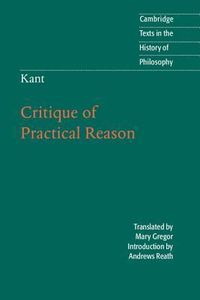Critique Of Practical Reason Quotes

"Act so that the maxim of thy will can always at the same time hold good as a principle of universal legislation."
"Pure reason is practical of itself alone and gives (to man) a universal law which we call the moral law."
"The moral law expresses nothing else than the autonomy of the pure practical reason; that is, freedom."
"The autonomy of the will is the sole principle of all moral laws and of all duties which conform to them."
"A rational being cannot regard his maxims as practical universal laws, unless he conceives them as principles which determine the will, not by their matter, but by their form only."
"All practical principles which presuppose an object (matter) of the faculty of desire as the ground of determination of the will are empirical and can furnish no practical laws."
"In every punishment, as such, there must first be justice, and this constitutes the essence of the notion."
"He who has lost at play may be vexed at himself and his folly, but if he is conscious of having borne false witness (although he has gained thereby), he must despise himself as soon as he compares himself with the moral law."
"It is every man's own special feeling of pleasure and pain that decides in what he is to place his happiness."
"The moral law, in fact, transfers us ideally into a system in which pure reason, if it were accompanied with adequate physical power, would produce the summum bonum."
"Now all our human insight is at an end as soon as we have arrived at fundamental powers or faculties, for the possibility of these cannot be understood by any means."
"The moral law is given as a fact of pure reason of which we are a priori conscious, and which is apodeictically certain."
"The moral law, which itself does not require a justification, proves not merely the possibility of freedom, but that it really belongs to beings who recognize this law as binding on themselves."
"Respect for the moral law is a feeling which is produced by an intellectual cause."
"Man is indeed unholy enough, but he must regard humanity in his own person as holy."
"In all creation everything one chooses and over which one has any power, may be used merely as means; man alone, and with him every rational creature, is an end in himself."
"The moral law is in fact for the will of a perfect being a law of holiness, but for the will of every finite rational being a law of duty."
"Duty! Thou sublime and mighty name that dost embrace nothing charming or insinuating, but requirest submission."
"The majesty of duty has nothing to do with the enjoyment of life; it has its special law and its special tribunal."
"Although physical life might gain somewhat in force, the moral life would fade away irrecoverably."
"The moral law is holy (unyielding) and demands holiness of morals."
"Morality is not properly the doctrine how we should make ourselves happy, but how we should become worthy of happiness."
"The moral law commands me to make the highest possible good in a world the ultimate object of all my conduct."
"The moral laws lead through the conception of the summum bonum as the object and final end of pure practical reason to religion."
"Morality should never be treated as a doctrine of happiness."
"Nothing glorifies God more than that which is the most estimable thing in the world, respect for his command."
"Even men can never acquire respect by benevolence alone, though they may gain love."
"It is only by this mode of conception, however, that we can attain what we are seeking."
"The consciousness of a determination of the faculty of desire is always the source of a satisfaction in the resulting action."
"The moral disposition of mind is necessarily combined with a consciousness that the will is determined directly by the law."